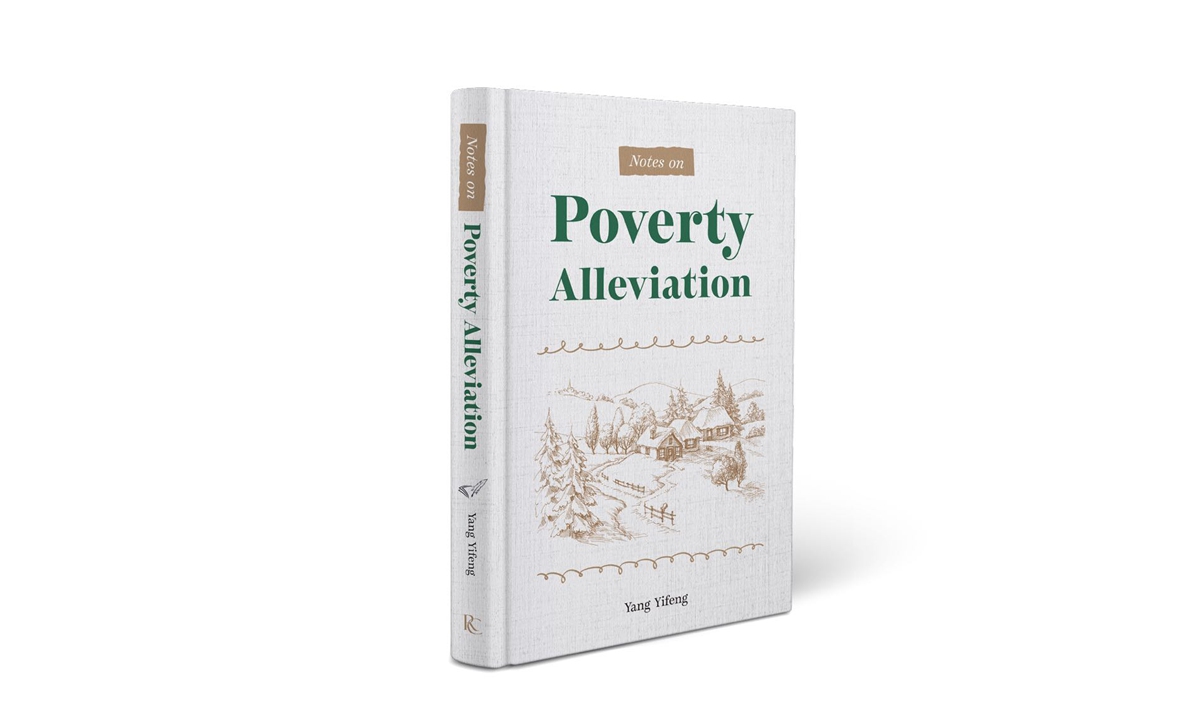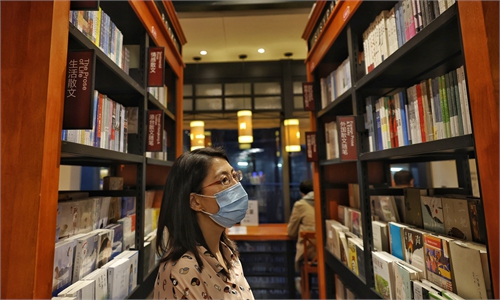
Photo: Courtesy of Yang Yifeng
Yang Yifeng worked for several years as a reporter for the overseas edition of the People's Daily newspaper in its Beijing office. In 2018, having amassed two decades of experience, Yang decided to sign up for a poverty alleviation project at People's Daily and never looked back. Three years, many projects and countless homes later, he decided to chronicle his incredible journey into the villages of China's more impoverished communities in his book, Notes on Poverty Alleviation.
This comprehensive first-hand account from Yang Yifeng is detailed, vivid and emotional, transporting the reader to the very homes of those affected by China's poverty alleviation program. Too often one encounters people within poverty alleviation who never actually venture to the places they proclaim to help: Which begs the question, how can one help the downtrodden most effectively without directly experiencing the livelihoods - the struggles and adversity - which do they encounter?
As Yang acknowledges in Notes on Poverty Alleviation, it is through these direct experiences that his eyes were really opened to the problems faced by those trying to escape poverty. In the book, following an honest conversation with government officials, he writes, "If you want to serve the people, you need to go to the fields. If you want to ensure food, clothing, compulsory education, basic medical care, and housing security of low-income families, you must visit their homes, taste the water from their hand pump well, and check the bricks that have just been laid at the construction site of dilapidated houses."
So this is what he does.
Yang spent the next few years traveling all over Luanping county - to several villages and settlements, such as Shipozi and Pingfang. Luanping county is in North China's Hebei Provinceand is in fact relatively closer to Beijing, but in many ways it seems like a world away from China's densely populated and developed capital city.
Luanping county has been a target area of the People's Daily poverty alleviation scheme since 2016. Since then, People's Daily has been providing assistance in the form of resources and services to Luanping and Yucheng county in Henan Province. Yang joined the scheme toward the end the journey as the objective of the Chinese government was to alleviate poverty entirely by 2021, 100 years after the founding of the Communist Party of China(CPC). However, if anything, this just galvanized him further. Yang spent the majority of the subsequent years in Luanping, often spending long stretches in the county without returning to Beijing. A close work colleague observes that after only two months on the project his "skin had grown dark, and he had become stronger. When he took his hat off, it took me a moment to recognize him."
Yang also describes the impact of his first arriva; in Luanping: "I had to live and work in a way that was different from what I was used to, to see things from a different perspective, and to develop different tastes."
It is clear this journey had a life-changing influence on the author himself as well as the poverty in Luanping.
As for the accounts themselves, there are several in the book. Although each account is unique, featuring a different character or family and a particular set of circumstances, there are general themes and trends that reoccur throughout Yang's experiences. The author notes how friendly and hospitable the locals he encounters are. On the whole, they are hardy but resilient people - accustomed to poverty and adversity, yet not bitter or grudging because of it. In the book, one old man tells Yang, "When I was young and still had my legs, no matter how hard I worked, I couldn't earn much money. The house I lived in let in air in winter and rain in summer. Sometimes I ate the same thing for a month. You can't imagine how hard life was. But now, I am so satisfied."
Another passage from a local goes, "In the past, I was worried about food and clothing, and whether we could light a fire to cook. It could be even worse if I got sick … the days of continuous stitching and patching are gone. In the past, it was good to eat a full meal. Now, we have higher expectations, and the taste, variety, and quality of the food can all be guaranteed."
These extracts typify the attitudes of those he has encountered across the county during these two years.
There are also many notable indicators in Luanping which underline the rapid progress being made in ridding the county completely of poverty. Many locals reflect on how their conditions have substantially improved in recent years - to the point at which they have attained genuine satisfaction through their improved life (whether this is due to improved health and medical supplies, heating, and electricity, or simply a consistent supply of food or income).
Even the author is surprised at how comfortable the lives of many in the county have become. In the very first chapter, he describes his first visit to Luanping. Moments after arriving, he is invited into a local's house and observes a large LCD television in the sitting room as well as a refrigerator, computer, television, and shower in the house. However, it wasn't always this way for the friendly locals - he tells Yang. It was really tough in the past: "My little girls had to wear the same clothes for five or six years. There was a time when we had to eat boiled cabbage every day. My daughters would burst out crying as soon as the lid was lifted. But things have really changed. We have better policies now, and we are more energetic and have more passion for life."
I think this encapsulates what poverty alleviation is all about. Before, the family is struggling just to eat and find clothes. Yet once they are able to rise above this basic state of subsistence, they are able to greatly appreciate and enjoy life. These people do not require huge amounts of money or luxury to attain satisfaction, they appear sincerely grateful for the work carried out by Yang and his colleagues in tackling poverty. In some cases, one change - for example providing free health assistance in the village - is pivotal in transforming lives of hardship, pain and poor health into happiness and longevity.
This transformation clearly inspires Yang. He acknowledges how much he has come to learn since he decided to join the poverty alleviation scheme. Yet he suffers a string of health issues himself whilst in Luanping. At one point he even had to return to Beijing immediately for surgery due to the severity of his condition. However, like many of the people in his book, Yang doesn't complain or moan but simply focuses his efforts on recovering. Thankfully, Yang is able to make a full recovery and is in high spirits once the ordeal is over. Although he is left feeling physically a little weaker, in his mind Yang attributes his mental strength to his experiences in Luanping.
It was not Yang's intention to write this book. As a journalist of several years, Yang kept records of all his activities in Luanping, writing detailed accounts of the many places, people, and homes he visited during this time. Only later - when communicating with other reporters at the People's Daily - came the idea suggested that somebody should compile a book on contemporary poverty alleviation efforts in China. With a plethora of recent first-hand experience and a full set of notes, Yang was considered an ideal candidate to write the book. And two years later, here we are. Upon completing Notes on Poverty Alleviation, Yang explained, "I was in tears when I finished typing the final words. I was not sad nor distressed, and I was not excited. I don't know the word to describe what I was feeling. To use a phrase I mentioned in one of my articles: 'There is a sort of emotion that comes from the eyes.'"
In spite of all his professional experiences, this is, perhaps, a new sensation for this seasoned reporter.
On a more nationalllevel, poverty has been a chief concern of the Chinese government for many decades. It is recognized that as a large and populous nation, China is prone to large variances in living standards and development. However, much effort has been placed in addressing these regional discrepancies, thereby ensuring that all Chinese people have access to adequate amounts of food, shelter, electricity, and healthcare, etc. Although it is difficult to measure poverty exactly, some government agencies and organizations have attempted to "construct" a poverty line - usually set at a particular level of daily income. For example, the World Bank's current definition of extreme poverty is subsisting on less than $1.90 per day (This was $1.00 US.) By this measure (or similar ones), poverty alleviation has taken place in China on a colossal scale. Half a century ago most Chinese people lived in poverty, yet over the last 40 years the majority of people have managed to rise above this subsistence level. This rise has been particularly strong in recent years, with extreme poverty almost eradicated in China. This has been a key government objective under Chinese President Xi Jinping, who made poverty eradication a central task of hisgovernment. Never in world history have so many millions of people been able to escape poverty in such a short period of time: By World Bank's estimates, 800 million Chinese have been lifted out of poverty in the last four decades. This is an extraordinary achievement.
In 2020 it was declared that Luaning county had officially got out of poverty. Yang may have only joined the struggle in the closing stages, yet his contribution to the county's poverty alleviation program was immense. Throughout the book, one can see that he is doing this out of compassion for his fellow countrymen, instead of pursuing some ulterior motive. Much of the book covers specific encounters or households in which Yang ventures, giving Notes on Poverty Alleviation a distinctively personal touch. Ultimately, it is a big deal to escape poverty - life-changing, of course. As so many Chinese people have been able to rise above poverty through the help of the government and the tireless work of people like Yang, it is invaluable to have a book documenting this journey. For those interested in stories about contemporary poverty alleviation efforts in China - told from a first-hand experience and the personal perspective - then look no further than Yang Yifeng's Notes on Poverty Alleviation.


